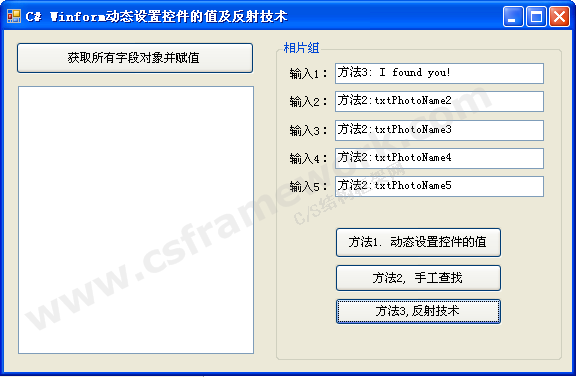C# Winform动态设置控件的值及反射技术应用
C# Winform动态设置控件的值及反射技术
批量给控件赋值
假设我们已知控件名的情况下,此方式适合查找命名不规范的控件.
假设我们已知控件名的情况下,但是控件所在的窗体或容器也是动态创建的.
获取窗体内所有字段定义.

批量给控件赋值
假设我们已知控件名的情况下,此方式适合查找命名不规范的控件.
假设我们已知控件名的情况下,但是控件所在的窗体或容器也是动态创建的.
获取窗体内所有字段定义.
批量给控件赋值
假设我们已知控件名的情况下,此方式适合查找命名不规范的控件.
假设我们已知控件名的情况下,但是控件所在的窗体或容器也是动态创建的.
获取窗体内所有字段定义.

批量给控件赋值
private void button1_Click(object sender, EventArgs e)
{
//
//批量给控件赋值
//
//通过控件的名字查找控件对象, 当找到该控件就赋值.
//这种方法要求控件的命名要有规律.
//
for (int i = 1; i <= 5; i )
{
//
//调用Controls.Find方法查找控件.
//
//Find()方法说明:
// Searches for controls by their System.Windows.Forms.Control.Name property
// and builds an array of all the controls that match.
//参数:
// key: <控件名称>
// The key to locate in the System.Windows.Forms.Control.ControlCollection.
//
// searchAllChildren:<查找所有子控件,递归查找>
// true to search all child controls; otherwise, false.
Control[] ctrs = this.Controls.Find("txtPhotoName" i.ToString(), true);
//查找到,赋值
if (ctrs.Length > 0) (ctrs[0] as TextBox).Text = "Name:" ctrs[0].Name;
}
}
// 来源:www.CSFramework.com, C/S结构框架学习网
{
//
//批量给控件赋值
//
//通过控件的名字查找控件对象, 当找到该控件就赋值.
//这种方法要求控件的命名要有规律.
//
for (int i = 1; i <= 5; i )
{
//
//调用Controls.Find方法查找控件.
//
//Find()方法说明:
// Searches for controls by their System.Windows.Forms.Control.Name property
// and builds an array of all the controls that match.
//参数:
// key: <控件名称>
// The key to locate in the System.Windows.Forms.Control.ControlCollection.
//
// searchAllChildren:<查找所有子控件,递归查找>
// true to search all child controls; otherwise, false.
Control[] ctrs = this.Controls.Find("txtPhotoName" i.ToString(), true);
//查找到,赋值
if (ctrs.Length > 0) (ctrs[0] as TextBox).Text = "Name:" ctrs[0].Name;
}
}
// 来源:www.CSFramework.com, C/S结构框架学习网
假设我们已知控件名的情况下,此方式适合查找命名不规范的控件.
private void button2_Click(object sender, EventArgs e)
{
//
//假设我们已知控件名的情况下,此方式适合查找命名不规范的控件.
//
//要查找的控件名. 名称可自定义
string names = "txtPhotoName1,txtPhotoName2,txtPhotoName3,txtPhotoName4,txtPhotoName5";
//使用分隔符(Char类型)转换成数组
string[] nameArray = names.Split(new Char[] { Char.Parse(",") });
foreach (string name in nameArray)
{
if (String.IsNullOrEmpty(name)) continue; //名字为空,不处理, 注意:String.IsNullOrEmpty方法
Control[] ctrs = this.Controls.Find(name, true); //在当前窗体内查找
if (ctrs.Length > 0) (ctrs[0] as TextBox).Text = "方法2:" ctrs[0].Name;
}
}
// 来源:www.CSFramework.com, C/S结构框架学习网
{
//
//假设我们已知控件名的情况下,此方式适合查找命名不规范的控件.
//
//要查找的控件名. 名称可自定义
string names = "txtPhotoName1,txtPhotoName2,txtPhotoName3,txtPhotoName4,txtPhotoName5";
//使用分隔符(Char类型)转换成数组
string[] nameArray = names.Split(new Char[] { Char.Parse(",") });
foreach (string name in nameArray)
{
if (String.IsNullOrEmpty(name)) continue; //名字为空,不处理, 注意:String.IsNullOrEmpty方法
Control[] ctrs = this.Controls.Find(name, true); //在当前窗体内查找
if (ctrs.Length > 0) (ctrs[0] as TextBox).Text = "方法2:" ctrs[0].Name;
}
}
// 来源:www.CSFramework.com, C/S结构框架学习网
假设我们已知控件名的情况下,但是控件所在的窗体或容器也是动态创建的.
private void button3_Click(object sender, EventArgs e)
{
//
//假设我们已知控件名的情况下,但是控件所在的窗体或容器也是动态创建的.
//
//使用反射技术给对象的属性或控件赋值
PropertyInfo pi = this.GetType().GetProperty("TestName");
if (pi != null) pi.SetValue(this, "使用反射技术给对象的属性或控件赋值", null);
//跟据名字获取字段对象
FieldInfo fi = this.GetType().GetField("txtPhotoName1", BindingFlags.Instance | BindingFlags.NonPublic);
if (fi != null)
{
object o = fi.GetValue(this);
(o as TextBox).Text = "方法3: I found you!";
}
}
// 来源:www.CSFramework.com, C/S结构框架学习网
{
//
//假设我们已知控件名的情况下,但是控件所在的窗体或容器也是动态创建的.
//
//使用反射技术给对象的属性或控件赋值
PropertyInfo pi = this.GetType().GetProperty("TestName");
if (pi != null) pi.SetValue(this, "使用反射技术给对象的属性或控件赋值", null);
//跟据名字获取字段对象
FieldInfo fi = this.GetType().GetField("txtPhotoName1", BindingFlags.Instance | BindingFlags.NonPublic);
if (fi != null)
{
object o = fi.GetValue(this);
(o as TextBox).Text = "方法3: I found you!";
}
}
// 来源:www.CSFramework.com, C/S结构框架学习网
获取窗体内所有字段定义.
private void button4_Click(object sender, EventArgs e)
{
//获取窗体内所有字段定义.
//打开xxx.Designer.cs文件看到的 private System.Windows.Forms.ListBox listBox1;等等...
FieldInfo[] fs = this.GetType().GetFields(BindingFlags.Instance | BindingFlags.NonPublic);
foreach (FieldInfo fi in fs)
{
object o = fi.GetValue(this); //获取字段对象
if (o != null)
{
if (o is Control) //判断类型
{
(o as Control).Text ="方法4:" (o as Control).Name;
this.listBox1.Items.Add((o as Control).Name);
}
}
}
}
// 来源:www.CSFramework.com, C/S结构框架学习网
{
//获取窗体内所有字段定义.
//打开xxx.Designer.cs文件看到的 private System.Windows.Forms.ListBox listBox1;等等...
FieldInfo[] fs = this.GetType().GetFields(BindingFlags.Instance | BindingFlags.NonPublic);
foreach (FieldInfo fi in fs)
{
object o = fi.GetValue(this); //获取字段对象
if (o != null)
{
if (o is Control) //判断类型
{
(o as Control).Text ="方法4:" (o as Control).Name;
this.listBox1.Items.Add((o as Control).Name);
}
}
}
}
// 来源:www.CSFramework.com, C/S结构框架学习网
版权声明:本文为开发框架文库发布内容,转载请附上原文出处连接
NewDoc C/S框架网







